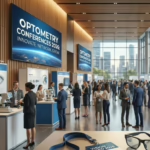
Routine eye exams are often considered a standard part of healthcare maintenance, primarily aimed at assessing vision and eye health. However, what many people may not realize is that these seemingly straightforward appointments can sometimes unveil unexpected medical conditions beyond the realm of eye health. In such cases, what starts as a routine eye exam can quickly evolve into a broader medical examination to ensure proper health of the patient’s eyes.
Eye exams typically involve a series of tests conducted by optometrists or ophthalmologists to evaluate visual acuity, check for refractive errors, and assess the overall health of the eyes. These examinations can detect common eye problems such as nearsightedness, farsightedness, astigmatism, and age-related conditions like cataracts or glaucoma. However, the eyes are also interconnected with various systems of the body, and certain abnormalities observed during an eye exam may point to broader health issues.
One common scenario where a routine eye exam transition into a medical examination is when signs of systemic diseases manifest in the eyes. For instance, conditions like diabetes and hypertension can cause changes in the blood vessels of the retina, leading to symptoms such as retinopathy or hypertensive retinopathy. Detecting these changes during an eye exam can prompt further investigation into the patient’s overall health.
Similarly, certain eye symptoms or findings can indicate neurological disorders or autoimmune conditions. For example, double vision (diplopia) may signal nerve dysfunction, while inflammation of the eye structures could be linked to autoimmune diseases like rheumatoid arthritis or lupus. In such cases, optometrists and ophthalmologists may refer patients to neurologists, rheumatologists, or other specialists for thorough evaluation and treatment.
It’s essential to recognize that the transition from a routine eye exam to a medical evaluation may initially catch patients off guard. Many individuals schedule eye appointments solely to address vision concerns or update their eyeglass prescriptions, without expecting broader health implications. Setting the right expectations from the start such as collecting medical insurance upfront and educating patients during testing can provide an easy transition when an exam is no longer routine.
When unexpected medical findings arise during an eye exam, patients should be informed promptly and provided with comprehensive explanations regarding the implications of the findings on their health. Optometrists and ophthalmologists play a pivotal role in guiding patients through the next steps, which may involve further diagnostic tests, specialist consultations, or treatment interventions.
Patients should be encouraged to maintain regular follow-up appointments with their eye care providers and other relevant specialists as needed. Monitoring changes in eye health and addressing any underlying medical conditions in a timely manner is paramount for preserving overall well-being and preventing potential complications.
While routine eye exams primarily focus on assessing vision and eye health, they can occasionally uncover unexpected medical findings with broader implications. Offices who are regularly looking for and can address/monitor the conditions mentioned above provide a more comprehensive care experience to patients. Having a medical focus in your practice can also provide more revenue as medical insurance usually provides higher reimbursement when compared to vision insurance. EyeAppoint is here to help with navigating medical billing as you begin providing more medical examinations and testing.



